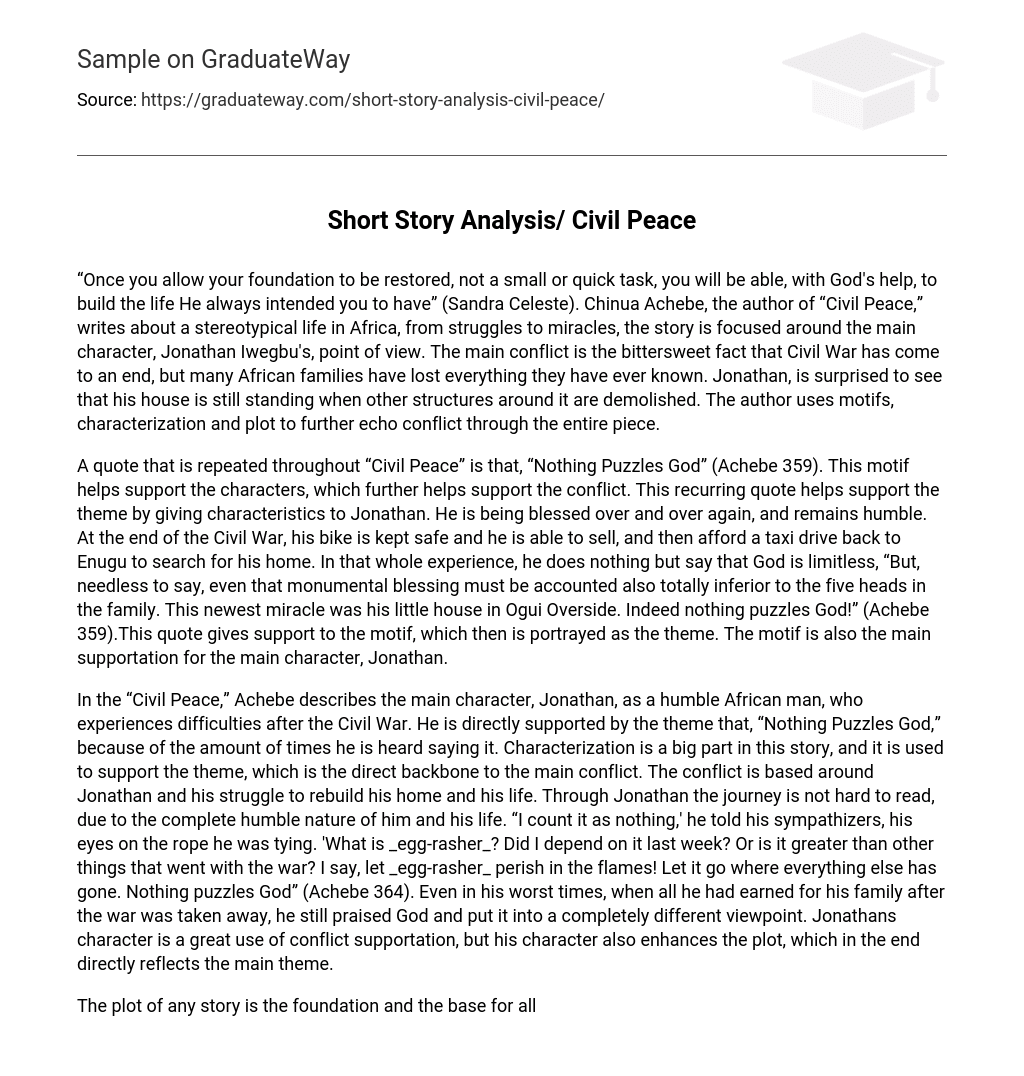“Once you allow your foundation to be restored, not a small or quick task, you will be able, with God’s help, to build the life He always intended you to have” (Sandra Celeste). Chinua Achebe, the author of “Civil Peace,” writes about a stereotypical life in Africa, from struggles to miracles, the story is focused around the main character, Jonathan Iwegbu’s, point of view. The main conflict is the bittersweet fact that Civil War has come to an end, but many African families have lost everything they have ever known. Jonathan, is surprised to see that his house is still standing when other structures around it are demolished. The author uses motifs, characterization and plot to further echo conflict through the entire piece.
A quote that is repeated throughout “Civil Peace” is that, “Nothing Puzzles God” (Achebe 359). This motif helps support the characters, which further helps support the conflict. This recurring quote helps support the theme by giving characteristics to Jonathan. He is being blessed over and over again, and remains humble. At the end of the Civil War, his bike is kept safe and he is able to sell, and then afford a taxi drive back to Enugu to search for his home. In that whole experience, he does nothing but say that God is limitless, “But, needless to say, even that monumental blessing must be accounted also totally inferior to the five heads in the family. This newest miracle was his little house in Ogui Overside. Indeed nothing puzzles God!” (Achebe 359).This quote gives support to the motif, which then is portrayed as the theme. The motif is also the main supportation for the main character, Jonathan.
In the “Civil Peace,” Achebe describes the main character, Jonathan, as a humble African man, who experiences difficulties after the Civil War. He is directly supported by the theme that, “Nothing Puzzles God,” because of the amount of times he is heard saying it. Characterization is a big part in this story, and it is used to support the theme, which is the direct backbone to the main conflict. The conflict is based around Jonathan and his struggle to rebuild his home and his life. Through Jonathan the journey is not hard to read, due to the complete humble nature of him and his life. “I count it as nothing,’ he told his sympathizers, his eyes on the rope he was tying. ‘What is _egg-rasher_? Did I depend on it last week? Or is it greater than other things that went with the war? I say, let _egg-rasher_ perish in the flames! Let it go where everything else has gone. Nothing puzzles God” (Achebe 364). Even in his worst times, when all he had earned for his family after the war was taken away, he still praised God and put it into a completely different viewpoint. Jonathans character is a great use of conflict supportation, but his character also enhances the plot, which in the end directly reflects the main theme.
The plot of any story is the foundation and the base for all characters, themes, or motifs. Plot is used to portray action throughout the story. In the “Civil Peace,” the author uses the plot to intensify Jonathans character and magnify the main conflict. The two most important conflicts that happen throughout the story are when Jonathan travels to Enugu and discovers that him and his family will be forced to work and rebuild their home and lives, and when Jonathan has worked and earned money but gets robbed and is left with nothing once again. The plot emphasizes these points when, “Jonathan and his family were now completely paralysed by terror. Maria and the children sobbed inaudibly like lost souls. Jonathan groaned continuously” (Achebe 362). The author uses syntax and diction in this excerpt, to support the plot. He used words like, “inaudibly” and, “paralyzed with terror,” which is called imagery and helps the readers have a direct connection to the plot. In many ways plot is used to further the conflict.
In many ways the author, Chinua Achebe, uses a motif, theme, characterization through the main character Jonathan, and plot, to support the main conflicts. These literary devices are key factors in the story of the “Civil Peace.” By examining the authors purpose of writing this piece, it is made clear that the intended theme is that, “Nothing Puzzles God.” Knowing that this is the theme and the authors purpose is important in determining the conflict and the reasoning behind it. In this case, the author uses the literary devices to further and extend upon the conflict.





